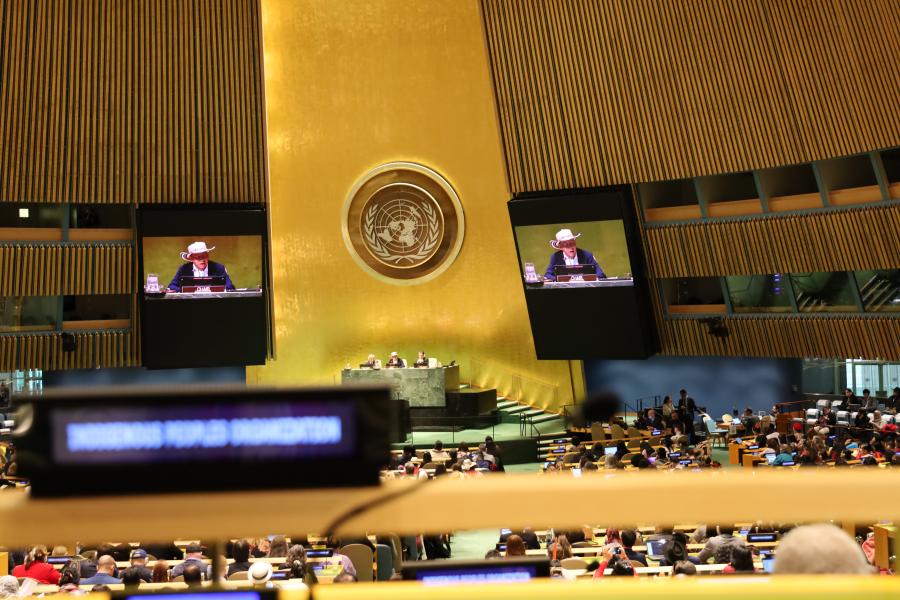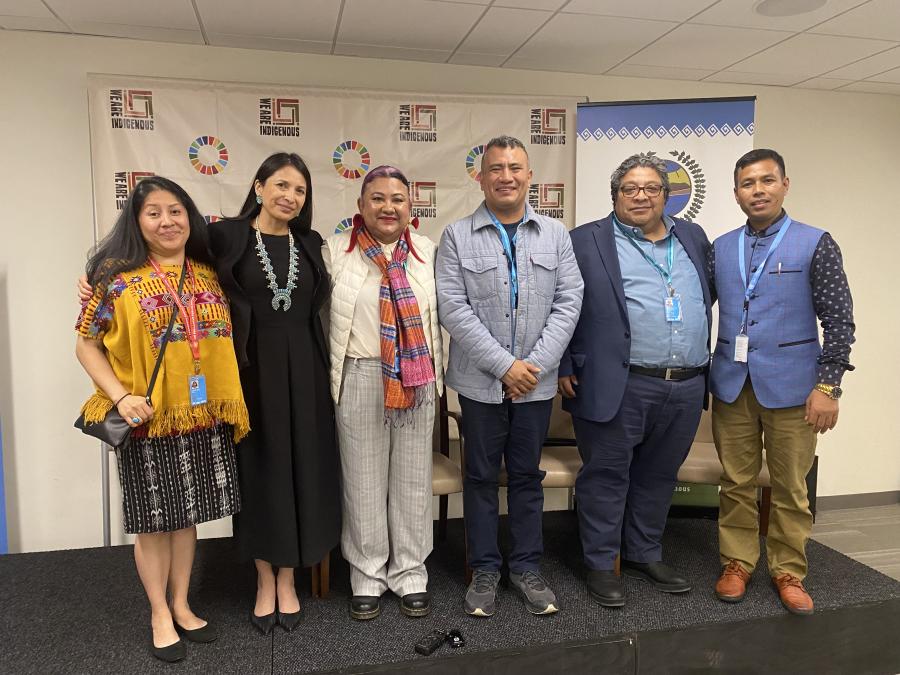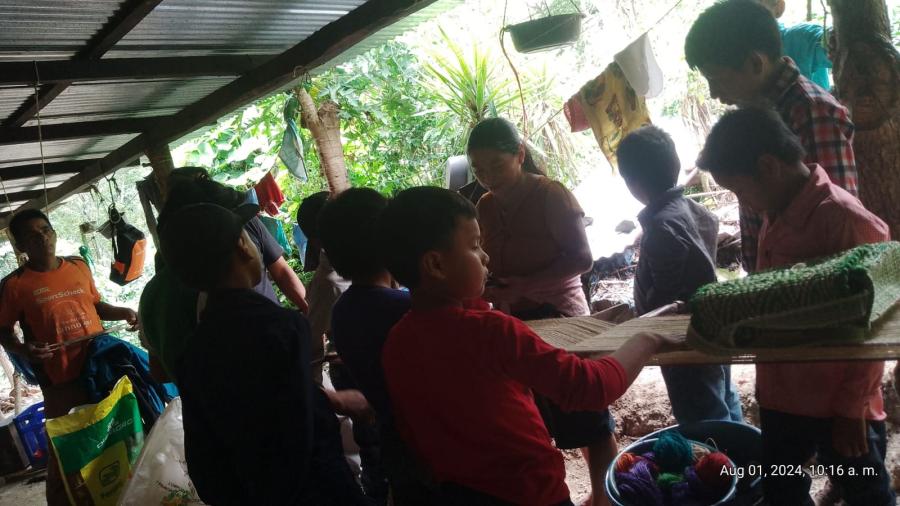Established in 1982, the Coordinating Body for the Indigenous Organizations of the Amazon Basin (COICA) links more than 400 indigenous groups, or roughly 1.5 million people, from nine national-level member organizations from each South American country with territory in the Amazon Basin. Though expressly a coordinating body, COICA, through active participation in a variety of international organizations (including the United Nations Working Group on Indigenous Populations) and forums (on topics such as sustainable development and intellectual property rights) has become a recognized voice through which Native people defend their rights, fight for the survival of their culture, and exchange experiences to find common solutions to the various problems shared by indigenous people. At a June 2002 meeting, COICA members declared that the internal armed conflict in Colombia should be resolved through political negotiation and created an ad-hoc international Bureau of Indigenous Peoples to defend the life, autonomy, and cultures of those affected by the violence. COICA is currently involved in a project to inform national and international governments and non-governmental organizations on the consequences of Plan Colombia for indigenous peoples and the Amazon in general.
As president of COICA, Sebastiao Manchineri is a pivotal player in the battle for indigenous rights. He and many other indigenous leaders from the Amazon have said that Plan Colombia is simply a plan for violence and is tantamount to a death sentence for indigenous cultures. Approximately 800,000 indigenous peoples from 81 different groups who speak 64 different languages live in Colombia, which has the world's second-highest rate of biodiversity in the world (following only Brazil). The country stands to lose a great deal of its cultural and biological diversity as the conflict continues. Leaders say the United States wants to solve the nearly four-decade-long conflict using its $880 million Andean Regional Initiative; they wonder how this new package will effect those indigenous people who suffer the gravest consequences of violence, military incursions, and dangerous fumigation techniques. They point to the Amazon as the battlefield for a war that is not their own but from which they suffer the greatest problems. Manchineri, an Ine Indian from Brazil, discusses the position of COICA regarding the Colombian conflict, as well as the effects of Plan Colombia on Brazil, which shares a 1,700-kilometer border with Colombia.
Manchineri gave the following analysis during an interview at the conference in Quito, Ecuador.
In Colombia there are 6,000 indigenous people in the FARC, but Indians are also in the Colombian army. In the end, we wind up fighting among ourselves in the interests of others. We are trying to help solve the problem of violence, but at the same time, we are hurting ourselves. It's like the war between Ecuador and Peru, where the principal actors were indigenous peoples fighting each other across the border. These people are used because if an indigenous person dies there is less trouble than when it's a non-indigenous person. In Brazil there used to be a law that if you killed an indigenous person it was not considered a crime. The same sort of unspoken law exists to this day.
Now in Brazil, there are also problems due to displaced peoples, people who come to the country looking for refuge from the guerrillas, mainly in Amazonian villages and communities. Militarization of the region is not a solution for the communities. The army arrives with its orders, displacing people along the way. The army is just like guerrillas or paramilitary groups in their violation of human rights. The only difference is that the law legitimates one, and not the other. It would be far better if they tried to work with the population.
The FARC and paramilitaries have also entered Brazil. They look for weapons. They look for drugs. They look for places to sell drugs. The Brazilian army can't be everywhere. The jungle is too large to control. The war has been going on for some time and so have violations of rights. We are not accustomed to the violence, but we have learned to live within it. We have problems, but it's not that we are scared. We have to find a way to play a more active role in our own defense, rather than simply be victimized. If not, we are not going to survive much longer.
Terrorism is the excuse given by the governments for their actions, but the governments act the same as the terrorists. Governments do not accept that each country is ethnically diverse. Instead, the government imposes an economic system that does not respect the rights of the various peoples. The people, in response, create their own means of survival.
If it were not for the war, companies that sell weapons would not exist. The companies benefit a great deal from the war. Who is interested in ending the war? The government? The companies? The politicians? No. The people who are suffering the most do not have the power to make decisions.
Drug trafficking, to me, falls into the same category as selling tobacco and alcohol. Countries like Colombia and Brazil should be allowed to produce coca. Then they could pay their external debt and provide money for social programs. Drugs are produced because there is a market for them. The only difference is that the drug is not benefiting the United States or its economic interest in the region. If the drug is going to be consumed in the United States, then it should be produced legally. There is no difference between selling cocaine, selling arms, and selling alcohol.
Consequently, we do not agree with Plan Colombia. Like the FTAA [Free Trade Area of the Americas] it does not focus on social issues. Both are plans of intervention, created by other countries for those of us in the Amazon. Plan Colombia violates specific rights of indigenous people and, with the contamination of the environment through fumigation, human rights in general.
The Indigenous Response
COICA is formally recognized by the United Nations, and we participate regularly in the U.N. Working Group on Indigenous Affairs. But we realize that the United Nations does not work very well. The system is too bureaucratic, and economic interests take precedence over social programs. The United Nations has commissions for human rights and commissions against the war, but they don't do anything. It is a body that holds meetings, but doesn't solve problems. The problems have to be solved by the people and by the government of the countries. The politicians in each country also have their own weaknesses. They are like outsiders, employees of multinational companies, or employees of some governments from the north. Government officials are not held responsible to their own people. Therefore, nothing changes, or not much changes. There are also economic interest groups like the IMF [International Monetary Fund] and World Bank, who come to take the natural resources that we have in our countries and impose a policy of control. The United States, the multinational companies, and the economic special interests have to change.
We are looking for something concrete, a mechanism that will judge and then punish these governments, organizations, or companies. For example, if we could manage to eliminate the sale of arms to different groups involved in the conflict, it would be a very significant advance. The government of [U.S. President] George Bush is simply looking to create problems in order to justify its policies. The people in the States do not have much power because everything is controlled by governmental actions. The government goes to the Amazon, it goes to third world countries, and they say they are looking to solve the problems, but the major problems are theirs, not ours. If they want to help us in some way, they need to start with their own countries. Or the government is masking what they're really doing through calls for political development, freedom, and democracy. COICA has mounted some political defenses to Plan Colombia [in consumer countries], but they have not been very successful. We are now thinking of ways that the Colombia and U.S. governments can be condemned, not only politically, but also legally. The United States has intervened in the sovereignty of Colombia. All have violated human rights and participated in the elimination of biodiversity in the Amazon. We have good relationships with international solidarity groups, but it isn't enough. We have to find practical mechanisms to achieve our goals. We have a tough road ahead. The economic interests involved in Plan Colombia are like parasites. They live off the misery of others. For them it is essential that this conflict continue, because they can continue to sell weapons. They will violate whatever rights are necessary for their own interests.
We are looking for a solution within the nine Amazonian countries. Of course, each country has its own interests, but we also have interests in common, such as land to live on and natural resources to defend. We know we cannot count on the government to help us. Governments are passengers for four or five years. We are going to live in our territories for eternity if nature permits.
Judith Walcott is a graduate of Tufts University and a former intern at Cultural Survival. She spent the last year in Ecuador on a Fulbright grant studying the effects of border conflicts on Ecuador’s indigenous peoples. She can be reached at judith_walcott@yahoo.com.



